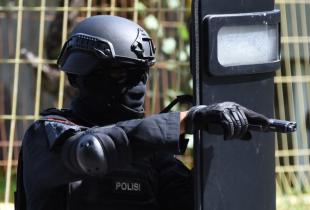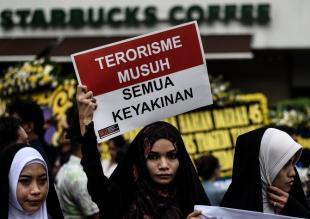JOURNAL | INDONESIA 360 by: I Gusti Bagus Dharma Agastia
Indonesia has not been a stranger to violent extremism and terrorism in recent years. In January 2016, Bahrun Naim, an Islamic State-trained militant, orchestrated an attack against a police post in the heart of Jakarta, prompting Indonesian authorities to step up countermeasures. The administration of President Joko Widodo has responded to increased extremist activity by cracking down on extremist sympathizers and organizations. Under the Mass Organizations Law, Indonesia officially banned Hizbut Tahrir Indonesia, an extremist Islamist organization. And a revised antiterrorism bill, slated to be passed this year, shows Indonesia’s strengthened resolve to counter violent extremism and terrorism.
In the future, however, the threat of violent extremism will only become more complex. How can Indonesia’s security sector cope with this looming challenge?
Increased military involvement
The counterterrorism scene in Indonesia will see the involvement of more security actors in the near future, with some gaining significant power. The Indonesian Armed Forces, or TNI, in particular will enjoy a larger role. Prior to the pending antiterrorism bill, TNI involvement in counterterrorism activities has typically been “under the operational control” (bawah kendali operasi) of another agency, usually the National Police. In Operation Tinombala, an ongoing series of joint police-military operations against homegrown terrorists in Central Sulawesi Province that began in 2016, the TNI served as a supplement to the police’s counterterrorism unit in hunting down Santoso, leader of the East Indonesia Mujahideen. Under the new antiterrorism bill, the TNI is expected to play a much larger role in countering terrorist groups. This is a reiteration of Article 7 of the TNI Law (Law 34/2004), where counterterrorism operations are included as one of the TNI’s 14 military operations other than war. The specific conditions under which the TNI can be deployed in counterterrorism operations is expected to be delineated under a separate presidential regulation.
While military involvement is crucial to aid counterterrorism efforts under specific conditions, there may be issues in the implementation of the stipulations in the new antiterrorism bill.
Article 43b of the draft bill simply states that the TNI will provide assistance to the National Police. A more specific delineation of duties is expected to be described in a presidential regulation. This, however, hands a large amount of power to President Joko in deciding how to deploy the military in counterterrorism operations, with a presidential regulation allowing the president to bypass Parliament. While legislators remain optimistic that the president will consult Parliament before issuing a regulation, this very process may permit abuses of power in the future.
Improving deradicalization efforts
The role of Indonesia’s National Counterterrorism Agency (BNPT) will be more crucial than ever. As the central agency dedicated to countering terrorism and violent extremism, the BNPT will continue to be on the front lines in preventing and countering violent extremism.
In 2014, the BNPT commenced a large deradicalization program that aims to “cleanse” convicts and captured terrorists in prison of extremist ideology. One prominent success story is the deradicalization of Nasir Abbas, the former trainer of the 2002 Bali bombers. Studies, however, have shown that there are more failures than successes in deradicalization.
In deradicalization, there is an emphasis on changing ideology. The program includes ideologically heavy “re-education” courses that claim to change the hearts and minds of extremists. However, as recent studies show, forcing ideological change is difficult due to the psychological backlash. This is captured in a quote from a convicted terrorist who participated in the research of academic Zora Sukabdi in 2015: “Changing our hearts and love for Allah and jihad is impossible, but changing our behavior so we stop bombing is possible, in fact we can.”
Indonesia’s deradicalization program also generally lacks the necessary resources. Prison officers often lack the training and expertise to deliver the program based on BNPT standards. Moreover, there is little post-program support. When ex-convicts return to society, they are often stigmatized and have trouble finding employment and emotional support. As a result, they tend to relapse and reconnect with former extremist networks. This reality is captured nicely in “Jihad Selfie,” a 2016 documentary by Noor Huda Ismail, an Indonesian terrorism expert.
For effective deradicalization, there should be a shift from an ideology-heavy approach to a more rehabilitative process that centers on convicts’ reintegration into society. The ideological approach should be replaced with behavioral therapy, along with the instilment of moderate religious values. Vocational training for convicts, provided by experienced interlocutors, should be increased. Access to microfinance may also be helpful in preventing recidivism in the long term.
Trouble in cyberspace
The Internet, especially social media, will remain the primary method for extremists globally to disseminate their ideology. Currently, the Indonesian government’s main approach to the cyber domain remains limited to banning websites preaching extremist thought and violence. The country’s intelligence services must become savvier in social media intelligence analysis.
The Joko administration banned more than 800,000 websites in 2016. Only 85 were found to be spreading radical ideology, according to The Jakarta Post newspaper. The bans have been shown to be highly selective. Following the ban on Hizbut Tahrir Indonesia under a presidential decree on mass organizations in 2017, its website was officially closed. However, other websites that have long disseminated extremist ideology, such as VOA-Islam and Arrahmah.com, remain untouched.
Encrypted messaging apps have also been targeted. In July 2017, the Indonesian government threatened to ban Telegram because it was being used to spread extremist ideology. However, the government backed off after the founder of Telegram, Pavel Durov, moved to cooperate with the Indonesian government in blocking extremist channels.
Seeking to limit speech online is highly risky. While it can make it more difficult for extremists to disseminate their propaganda, there are both strategic and social risks. Banning websites forces extremists to move their cyber base of operations into darker territory where government surveillance is lacking. As Shahzeb Rathore, the Pakistani author of the book “Deep Web: The ‘Dark’ Side of IS,” notes, as governments seek to restrict activity in the “surface web” (the Internet that is indexed by search engines), extremists are more likely to shift to the dark net, where their anonymity is greater. Additionally, due to the ease of creating new websites and transferring content to new domains, the authorities would need sufficient resources to keep up with this elusive game of cat and mouse.
Within a social context, the enactment of blanket bans will likely position the government as infringing upon civil liberties. This is further exacerbated by ambiguous legislation, such as controversial laws on information technology and blasphemy, both of which have been used to curtail freedom of expression online. This may work against the government, as it allows extremists to construct a strong antigovernment narrative to peddle to the public.
Preventing the radicalization of women
The Jakarta-based Institute for Policy Analysis of Conflict (IPAC) observed that Indonesian women, especially migrant workers, are especially vulnerable to extremist ideology. Along with perceived “Christianization” attempts, the war in Syria is one of the contributing factors to increased radicalization of female Indonesian workers. According to IPAC, women workers facing real-life turmoil due to work and family issues often find solace in online groups that may be linked to extremist or terrorist groups. Radicalized women are then recruited to support jihad operations, from financing to participating in suicide bombings.
There is a growing body of research suggesting that women in a number of Muslim-majority countries also play an important part as “domestic radicalizers.” This is due to the role of women as maternal figures who educate their children. In Southeast Asia, women who experience repression tend to be more adamant in ensuring their children’s or family’s religious compliance. The issue is when women only have access to extremist sources, be it through extremist-oriented online chat groups or a radical religious figure.
To prevent radicalization of Indonesian women, empowerment is essential. Women need to be provided with socioeconomic opportunities to shield them from extremist propaganda. This can be done through the invigoration of the Family Welfare Movement in villages across the country. The government, through the National Counterterrorism Agency, and with help from relevant civil society organizations, can assist by helping women establish home businesses or religious study groups. Regarding migrant workers, there needs to be a concerted effort by the domestic security sector, in cooperation with Indonesian embassies abroad, to understand and detect early signs of radicalization within migrant worker groups. This may include increased outreach efforts through social activities by missions abroad.
What next for the security sector?
Seeing these future trends, it is clear that the security sector should increase interagency coordination, along with increasing civil society participation. Being on the front line, the BNPT should act as a “hub” for the many security actors involved in counterterrorism and countering violent extremism. As a hub, the BNPT should become a facilitator for other security sector actors through capacity building and as a center for aggregating expertise from government officials, practitioners and academics.
There must be ample coordination among intelligence bodies, the police and the Armed Forces. In the cyber domain, intelligence services play an important role in early detection. To maximize their effectiveness, intelligence services need to improve their social media intelligence capabilities. There should also be ample information sharing among these three agencies to ensure they all operate with the same point of reference. In countering violent extremism at the grassroots level, the government can also turn to civil society organizations for assistance. Civil society organizations with strong community networks are prime candidates to be provided with funding to carry out their mission.
Overall, Indonesia’s security sector ought to remember four key points for countering violent extremism in the future. First, the Internet will continue to be the primary domain for the dissemination of extremist ideology, especially social media. Having adequate social media intelligence capabilities is a must. However, this does not necessarily discount offline methods of radicalization, especially in rural areas. Intelligence agencies play a large role in early detection, including in the cyber domain. Second, “soft” approaches, as opposed to kinetic approaches, must be prioritized. Kinetic measures should always be reserved as a last option. Even as a last option, counterterrorism operations should first be initiated by the police, with military assistance being provided only when necessary. Third, deradicalization programs need to incorporate better post-program measures to prevent participants from reconnecting with former extremist networks. And fourth, the security sector must better coordinate among themselves and cooperate with civil society organizations. These organizations can assist in preventing radicalization of women and reintegrating ex-convicts back into society.
I Gusti Bagus Dharma Agastia is a lecturer in international relations at President University in Cikarang, West Java Province.
 Ancient scourge exposes Indonesia's health care flaws
Ancient scourge exposes Indonesia's health care flaws  Border Five-O : Protecting Indonesia's territory
Border Five-O : Protecting Indonesia's territory  Indonesia's next terrorist fight
Indonesia's next terrorist fight